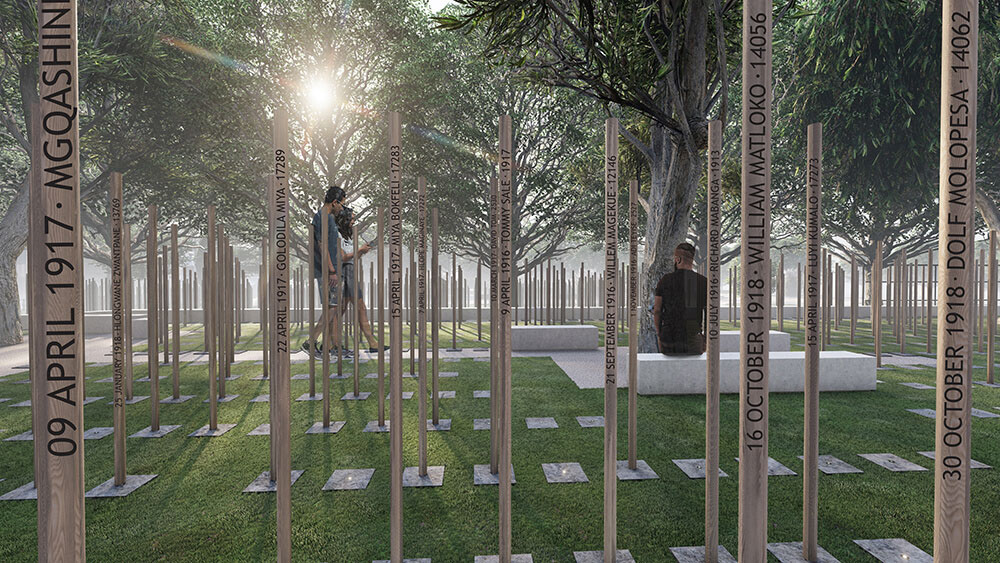17 October 2024
Voices of Remembrance: The importance of interviewing Kenyan Second World War Veterans
Heritage Manager Patrick Abungu reflects on why the veterans’ interviews undertaken by the Non-Commemorations Programme (NCP) field team in Nairobi interviews hold deep meaning – giving forums to the long forgotten silent memories to become voices that can be shared across the globe with diverse communities.
Interviewing Second World War Soldiers
Ezekiel Nyanjong’ Anyange: the WW2 Veteran from Nyakach, the land of Luo warriors, Kenya

Image: Ezekiel Nyanjong’ Anyange with his family and NCP team (Photo courtesy of Patrick Abungu)
The Nyakach clan is historically known as the last frontier of the Luo migration to the then area known as the Kavirondo and now the lake basin region.
Nyakach warriors helped the migrating Luos to maintain their borderline with the neighbouring communities that they had pushed back from the occupied area, skirmishes that endure to date, especially during raids for animals by the livestock loving Kalenjin community.
Therefore, it is not a wonder that Mzee Ezekiel Nyanjong’ Anyange, served and excelled in military service in the Second World War.
After his discharge at the end of the war, due to his work ethics and diligence, he was reenlisted again and was part of the group that were involved in the construction the Mackinnon Road Military Camp, which served as an assembly point for military personnel who served in Egypt in the 1950s.
Mzee Anyange has not only been recognized by the replacement of his medals by the King, but he was also recently recognized by his Nyakack community leaders and elders as a world war hero.
When we met him, he had just been installed as an elder and a community leader, and in his possession were a stick and flywhisk, symbols of recognition as a leader.
Diary of the interview

Image: Interviewing Ezekiel (Photo courtesy of Patrick Abungu)
After a series of interviews with WW2 veterans in Kano in Kisumu County that morning, the team headed for Nyakach area, in Kisumu County.
A member of the Defence Forces Comrades Association (DEFOCA) had pointed us to Ezekiel Nyanjong’ Anyange, a WW2 Veteran for an interview.
We were informed that he has a very good memory despite his age of 104 years. Driving through twisting and climbing roads across a scenic countryside to Mzee Anyange’s home was refreshing.
When we arrived, we were welcomed by his family. Some of the team members had previously met him, and one of his sons - Hosea Imbo – last year.
Creating a space to share sometimes painful memories

Image: Ezekiel Nyanjong’ Anyange and family in his house (Photo courtesy of Patrick Abungu)
Since Ezekiel and one of his sons Hosea, remembered some of us from the first meeting, we started off the interactions from a familiar term.
After the initial greetings, we were ushered inside the house by the family, had a word of prayer by Mzee Anyange, followed by individual introductions by the NCP team and the family.
We knew that the family were not expecting us that day, and what was obvious to us was the welcoming environment of the entire home and the importance placed on our visit.
The team chatted with the veteran and his family as we set up the interview equipment, and soon we were ready for the impromptu session that was added to our plans by chance.
Sharing oral histories – techniques
When the interview began, it was clear that we were in for a quality session due to the clarity of mind of the interviewee and his sharp memory for dates, days and activities that he was involved in many years ago.
We also realised that he was very honest with his answers because he was asked several times if he was involved in active fighting engagements, and he kept on giving the same answer about not taking part in active fight, but was part of those who formed the buffer on the frontline as their deployment to the frontline came after the adversaries had been defeated.
He didn’t try to take any glory in something he didn’t do, which would have been easy to do without any verification mechanisms in place.
Oral historians listen and gently asked for clarification of earlier statements, in this case, each time, the same story was repeated, with same dates and days as he had provided in his earlier replies.
Ezekiel was asked if he remembers the people who served with him, to which he provided some names.
When asked if any of his friends had died during their service together, and if he remembered their names, he provided a name of his late friend, what the friend did as a profession in military service, and where he was buried.
All the details checked out with the CWGC records. It was one of the best interviews the team had ever had and even better because it was not planned for in advance.
The Importance of the Non-Commemoration Project
Interactions, such as the interview we had with WW2 veteran Ezekiel Nyanjong’ Anyange, are what makes our NCP work worth doing and fulfilling, as we give forums to the long forgotten silent memories to become voices that can be shared across the globe with diverse communities.

Get the latest updates on the incredible work of the Non-Commemoration Programme team.
Non-Commemoration
